Want to learn how our REP scheme has impacted our students? Discover their experiences in our student blogs at the end of this page.
What do I need to know about the Research Experience Placement (REP) Scheme?
- The OneZoo CDT can offer Research Experience Placements each year across our partner institutions (Cardiff University, Aberystwyth University, Queen’s University Belfast and the London School of Hygiene and Tropical Medicine).
- Please note not all our partner institutions are able to host placements and those partners which do host placements may vary from year to year. The number of placements we are able to offer will also vary each year dependent on the allocation we receive from NERC.
- Projects are advertised internally in those of our partner institutions who are hosting placements. However, our ambition for 2025 is to advertise all placements on onezoo.uk and through the host institutions standard internal advertisement platforms. We expect that student applications will be open from Mid-March 2026, with closing dates in early April.
- The interview and selection process will be undertaken by the host institution, who will notify the successful candidate and put in place the arrangements for the placement. Please check with the host institution for timescales and deadlines.
- Successful candidates will commence their REPs after the end of the undergraduate summer term 2024 (after 13th June 2026).
- Duration of the placements will be 6 weeks and may be carried out on a full-time or part-time basis.
- It is a requirement that all successful candidates complete an online report at the end of their placement.
- Students will be paid the National Living Wage rate and where necessary receive a contribution towards research and training expenses of up to £500 during the placement. There are no further funds available for relocation or living expenses.
General Eligibility of participating undergraduate students
Students are subject to eligibility criteria to be able to apply for NERC REPs and must be:
- Undertaking their first undergraduate degree studies (or integrated Masters).
Note: students in their final year who have graduated and no longer have student status at the time of the placement start are not eligible.
And
- Eligible for subsequent NERC PhD funding (see the relevant text in the UKRI Terms and Conditions for Training Grants and associated guidance for further information).
More information for the scheme can be found here: https://www.ukri.org/what-we-do/developing-people-and-skills/nerc/nerc-studentships/funding-for-nerc-studentships/undergraduate-research-experience-placements-reps/
Mara Kille – from the University of St Andrews
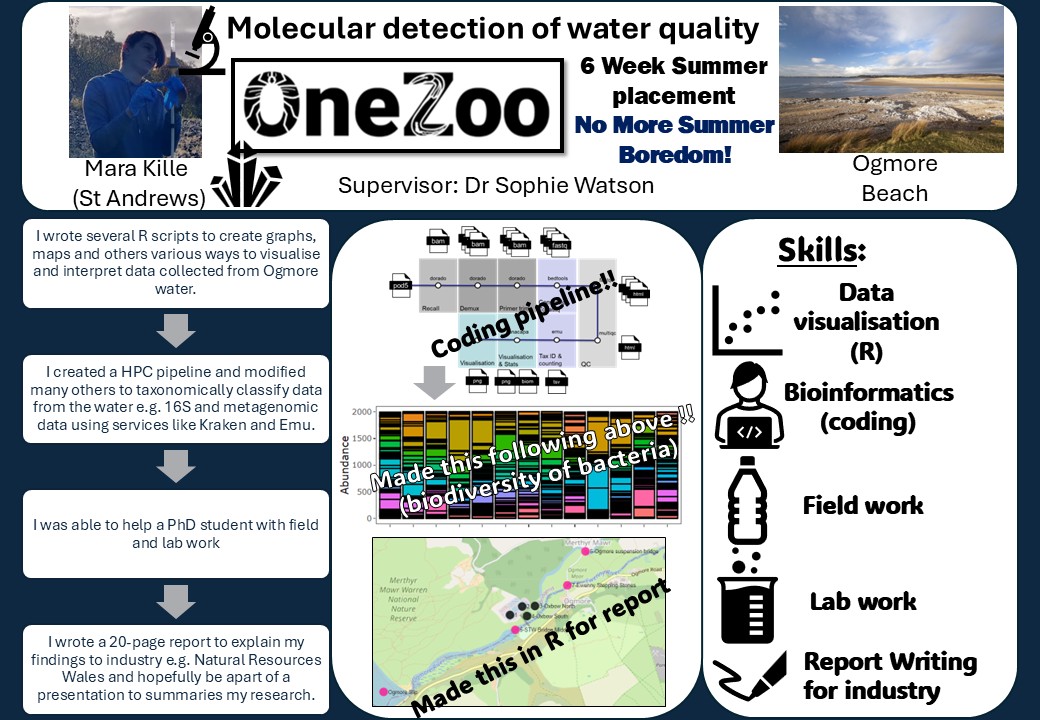
Tobias Nunn – Bangor University
My internship comprised 6 weeks from the end of June to early August. I designed a keyword search, iterating through a number of combinations, to reach a relevant list of papers, using the Scopus citation database. I then recorded which pathogenic species were discussed, along with metadata such as dates, locations and host information.
To support this methodical literature review, I created a structured database. With this, questions could be answered about important waterborne diseases in the UK.
As an additional part of the work, I created visualisations from the data in an R/Shiny dashboard and an accompanying poster which I will later have the opportunity to present to senior stakeholders in Cardiff.
This work was very engaging, it was as interesting as it was useful. I developed many skills that will be important for me going forward. Firstly, one of the most important is discipline when conducting a literature review, which will be a vital skill when undertaking my undergraduate dissertation next year. However, there were many other benefits, such as: developing professional communication skills, remote working, coding in Excel & R and data presentation & organisation.
Everyone I met was very friendly and welcoming. Communication with my supervisor was very easy, she was always ready to help if I got stuck, or needed to talk over the specifics of the project. Whilst I was free to take the work in my own direction, I never felt overwhelmed and I would recommend one of these internships for anyone interested in the areas of science they involve.
Kashia Dias – Cardiff University
Throughout my Research Experience Placement, I had the opportunity to test methods for the detection of the foodborne pathogen Listeria monocytogenes in rocket salad. This research interested me due to its application to real-world food poisoning outbreaks, the susceptibility of contamination in pre-washed salads, and the lack of a robust method to test salads for pathogens.
The placement included growing rocket salad under controlled conditions, applying pre-harvest stressors, and inoculating the leaves with Listeria; using selective media to quantify the survival and colonization of Listeria on the salad leaves; analyzing datasets of chromatography outputs using ChromCompare and R, using advanced statistical methods, including PerMANOVA and Random Forest, to identify volatile organic compounds that indicate the presence of pathogens; and comparing my results with previously collected data to assess validity and reliability. This allowed me to improve my skills in aseptic technique, applying the biochemistry and microbiology skills I learned in lectures to a relevant and ongoing research project. Presenting my work at lab meetings, collaborating with other students in the lab, and comparing my results to published methods also gave me valuable insight into what it is like to work in a research setting.
I am immensely grateful to the OneZoo team and to my supervisors, Professor Hilary Rogers, Dr Cedric Berger, and Dr Carsten Müller, for this opportunity as well as for their guidance throughout. I look forward to applying the skills gained in this placement to my future studies and career.
Lily Anderson – Cardiff University
This placement has been a great opportunity to further develop my lab skills in the area of molecular ecology. Over the ten weeks I have had the opportunity to get involved with every step of the processes, from DNA extraction to PCRs and gels and sending samples off for sequencing. Although I already had experience in these areas from the beginning of my undergraduate studies it’s been a great opportunity to develop them further. Learning to tackle challenges by myself in the lab, especially how to begin optimising PCRs has been a great experience that’s really developed my confidence in laboratory techniques.
I’ve also enjoyed learning new population genetic analyses. Learning to use platforms such as geneious has been a challenge but will be hugely useful in the future. Beginning to use relatedness tests to explore the population structure of the data set was really interesting. To be a part of the research process all the way through, from DNA extraction to analysis of the results, has been a great experience.
Over the summer it’s been lovely to be part of my supervisor’s lab group, especially as I will continue in the same lab next year. The support from everyone in the lab has been hugely appreciated throughout the placement. Joining in active research this summer has been great, and I look forward to continuing to be a part of it. All the skills I’ve acquired through this placement will be invaluable through my master’s as I plan to pursue a similar area of research.
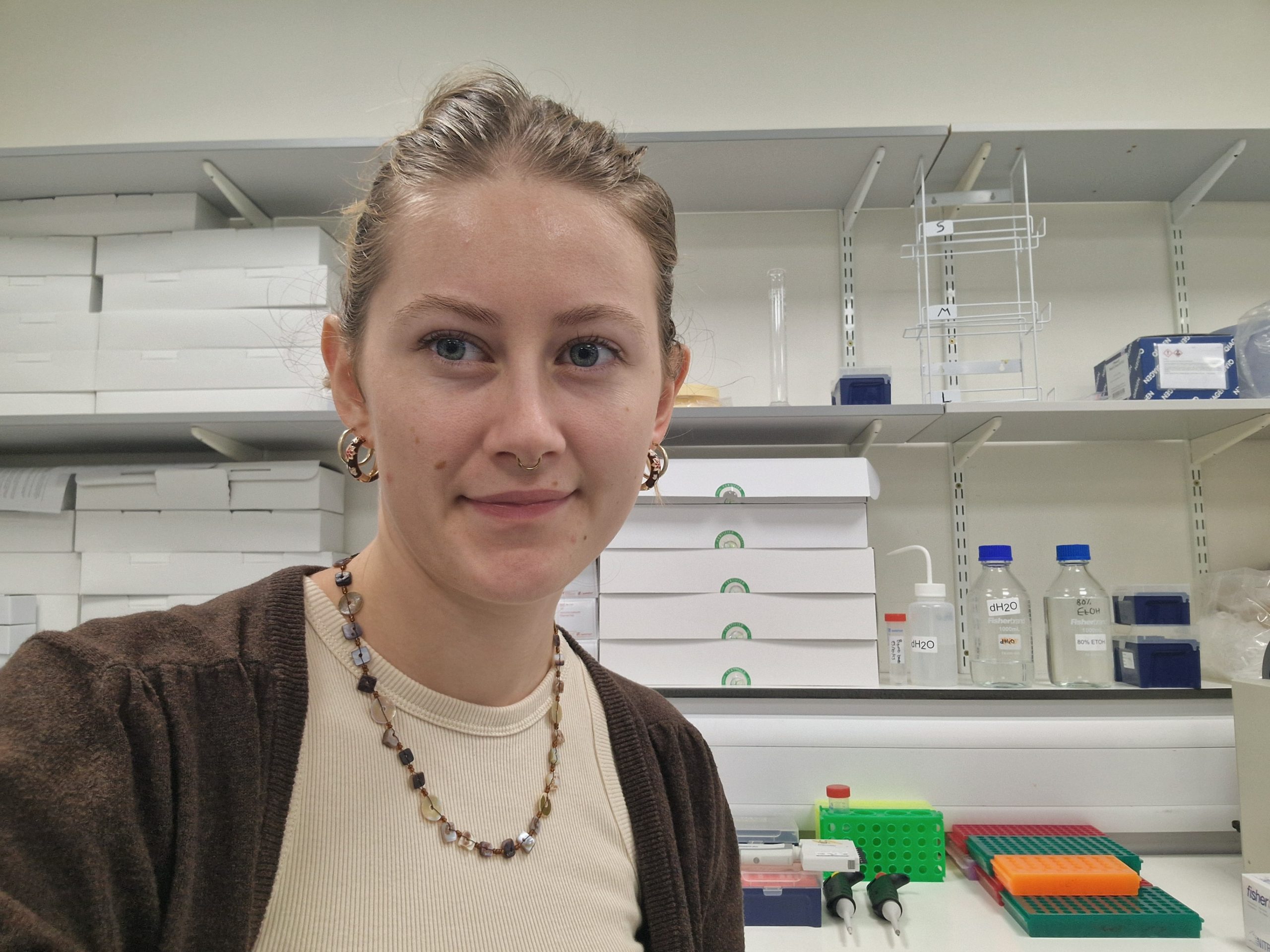
Matthew Passmore – from The University of South Wales:
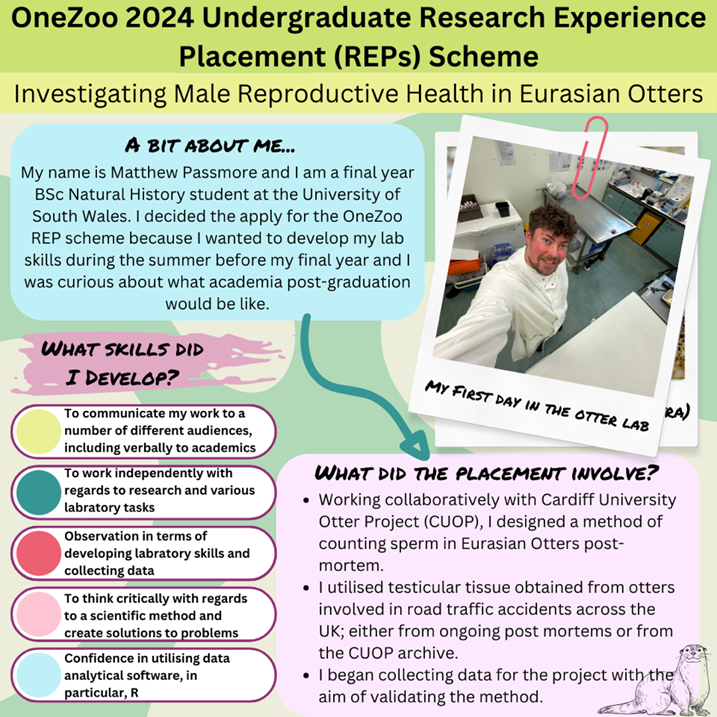
Aimie Davison – from Edge Hill University:
The placement with one zoo was an incredible opportunity that I am grateful to of experienced. It was exceptionally beneficial to me in a multitude of ways. It has provided reassurance of my choices alongside helping me determine the aspects of biology I want to focus on and engage with going forward in my career.
I very much enjoyed my time there and found it to be a fulfilling way to spend 6 weeks over summer while gaining experience in the biological field. Additionally, it has granted me a strong foundation in both experience and connections. This has helped me broaden my considerations for post graduate options, especially with considering a PhD. Over the 6 weeks I worked in both a molecular laboratory and a wet laboratory. It was my first time working in a wet lab which was especially exciting due to it allowing me to develop an entirely new set of skills like fish husbandry (the fish were incredibly cute!). It also significantly broadened the range of my experience. Along with these new skills it gave me chance to focus on my molecular based skills, this enabled the continuation of improvement in basic lab skills like pipetting to running protocols for PCRs, DNA extractions (extending into eDNA), gels and such. It was great to participate in active research at such an early stage in my degree (having just finished first year), it has helped reassure me that even with my ASD I am capable of working and excelling in this field.
Overall, everyone was lovely and so accommodating which made it such a joy to go in each day. I found it to be a fantastic opportunity that I am so fortunate to have had. I also had a lovely time exploring Cardiff.
Sophie Harries – from Aberystwyth University:
During my Research Experience Placement with OneZoo, I improved and acquired laboratory skills and techniques, while gaining a deeper understanding of
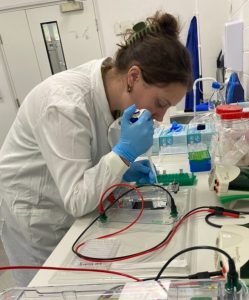
Mycobacterium bovis transmission between wildlife and cattle and the implications of bovine tuberculosis (bTB) on cattle herds, farmers and wildlife through literature evaluation.
I visited the Wales Centre for Mycobacteria (WCM) and the Wales Genomic Health Centre (Canolfan Iechyd Genomig Cymru, CIGC) in Cardiff to expand my knowledge of the techniques used for studying human tuberculosis. During the visit, I learned about heat inactivation, qPCR, and the specific primers used to target different species of mycobacteria. I also explored the process of method validation, such as spiking samples for testing, as well as whole genome sequencing and bioinformatics.
Additionally, I visited the Centre of Excellence for Bovine Tuberculosis (CBTB) in Aberystwyth to gain a deeper understanding of bTB research. There, I practiced various laboratory techniques, including culturing and extracting M. bovis Bacille Calmette-Guérin (BCG) SSI and Tokyo strains, as well as performing PCR and electrophoresis in a Containment Level 2 (CL2) lab. This was an invaluable opportunity to apply the techniques shown at WCM and CIGC. I also participated in lab meetings, which provided valuable insights into an environmental science career and interesting discussions surrounding research, including the effects of M. bovis infection and prevalence on badger population structure in which I created a map on QGIS to visualise the location of badger samples across Wales.
This placement has allowed me to explore new topics, and I have thoroughly enjoyed learning more about the environmental and social impacts of mycobacteria. I am excited for the coming weeks and months, as through networking during my placement, I will be assisting at the AberTB Conference in Aberystwyth and continuing this research into my final year dissertation.
Emi Jelamschi – from Cardiff University:
My recent research experience placement with OneZoo was a truly rewarding experience. As a Biological Sciences student, I was excited to contribute my educational background to a unique research project and gain insights into the world of environmental and epidemiological research.
My project involved contributing to a meta-analysis investigating the potential of wildlife-vehicle collisions (WVCs) as a tool for zoonotic disease monitoring, with an emphasis on parasitic infections. In addition to the project, I was responsible for data collection for a citizen science project called The Road Lab.
Throughout the internship, I enhanced my data analysis, critical thinking, and scientific writing skills which I look forward to applying in future projects. Anoth
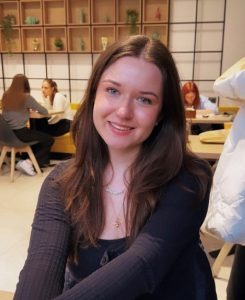 er aspect I really enjoyed was collaborating with other interns and learning about their projects as well, it was great to exchange ideas and gain different perspectives, making the whole experience even more enriching.
er aspect I really enjoyed was collaborating with other interns and learning about their projects as well, it was great to exchange ideas and gain different perspectives, making the whole experience even more enriching.
Presenting findings during weekly meetings also helped build my confidence in communicating effectively to a diverse audience. Additionally, I learned a great deal from my supervisors, they were very supportive and approachable. The feedback I was given during the experience was not only helpful but informative, I appreciate the way my supervisors and the rest of the OneZoo team guided me through the project.
Overall, the REP greatly enhanced my skills and deepened my understanding of collaborative research in the field.
Laura Hutchinson – from Swansea University:
I’ve just completed my six-week research experience placement with OneZoo CDT at Cardiff University, where I was studying the effects of plastic additive chemicals on Daphnia magna. My main responsibilities included maintaining a healthy D. magna stock, screening Daphnia under a microscope to assess their health, and helping design experiments to test the impact of flame retardants on Daphnia. A significant part of my time in the lab involved identifying key anatomical features like the heart and mandible, as well as becoming familiar with the Daphnia life cycle and distinguishing between asexual and sexual reproduction.
One of the biggest challenges I faced during this placement was the chemistry involved in ecotoxicology, especially since I hadn’t studied chemistry since high school. Although it was a steep learning curve, I enjoyed the challenge, and this experience gave me a much stronger appreciation for the interdis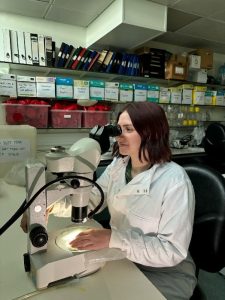 ciplinary nature of scientific research. Learning how to connect biological observations with chemical processes was both rewarding and eye-opening.
ciplinary nature of scientific research. Learning how to connect biological observations with chemical processes was both rewarding and eye-opening.
Working in the lab alongside professionals was an invaluable experience. I gained practical skills in microscopy, learned how to design and run experiments, and got a real sense of what working in a research environment is like. This placement has also given me a clearer vision for my future after university and I now feel more confident about pursuing further research.
I’m incredibly grateful for this opportunity and want to thank everyone who made this placement possible, especially my supervisor, Numair Masud, who has been an excellent mentor over the last few months. I’m excited to apply what I’ve learned to my future studies and career.
Faiz Syafie: from the London School of Economics
This summer, I had the incredible opportunity to join OneZoo’s Undergraduate Research Experience Placement (REP) Scheme at Cardiff University, working in the wet lab with fish and parasites. Despite my background in Actuarial Science, I embraced the chance to explore a completely different research area. This experience deepened my appreciation for research flexibility and the value of transferable skills to work in new and different contexts.
I was put under the supervision of Steve Cheung, who oversaw my tasks and learning process. For the most part, I got to understand the context of the research topics that were done at the lab, about fish husbandry and the Home Office regulations for working with living vertebrates. As part of being in the lab, I also helped out with routine lab tasks such as recording parasites and also general maintenance of the lab. As someone majoring in a quantitative field, I also appreciated that I got to practise and polish my statistical analysis methods through coding workshops in R. I had the chance to see the methods I was already familiar with but in a new, unfamiliar context.
Additionally, I had the chance to participate in fieldwork for a project on water voles. With support from Nia, the project lead, and fellow student Megan, I learnt to collect, record, and store samples while developing my navigation and planning skills from having to map out coordinates and optimising our routes. This was entirely new to me and incredibly rewarding, especially since I would not normally have access for such ‘hands-on’ research experiences.
Overall, this experience was immensely beneficial, and I am grateful to be able to participate in this scheme. I look forward to apply what
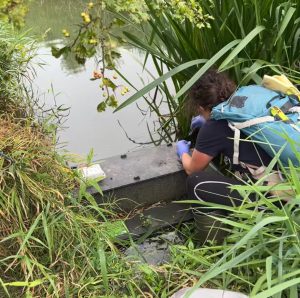 I’ve learned in these short 6 weeks to future opportunities.
I’ve learned in these short 6 weeks to future opportunities.
